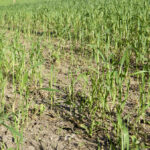
Tag Archives National Farmers Union

Comment: We must respect Mexico’s food sovereignty
Mexico has a right to determine its corn policy, even if the U.S. and Canada don’t like it

NFU claims victory for wheat producers after CGC reversal
The changes would've seen the export grade standard applied to deliveries to country elevators

Comment: NFU stance on business risk management programs mystifying
Why would a farm group dedicated to farmers support a report undermining farmers?
POLICY Why would a farm group dedicated to farmers support a report undermining farmers?
The National Farmers Union (NFU) has a long and proud history of supporting the pillars of Canadian farm policy. The NFU has over the years supported good public policy such as crop insurance, the Crow Rate, orderly marketing, supply management, the Canadian Wheat Board, public plant breeding, and the PFRA, which included the tree nursery
NFU calls for agriculture to ‘scale back’ nitrogen use, export goals
System transformation, not tweaking, is needed to mitigate climate change, says new report
EMISSIONS System transformation, not tweaking, is needed to mitigate climate change, says new report
Pushing for higher yields and greater exports each year will lead to greater nitrogen greenhouse gas emissions, even if greater efficiency is achieved, says a new report from the National Farmers Union (NFU). “If we do not scale back… if we pretend instead that tweaking our nitrogen-use practices can solve the problem, we may make
Comment: Biofuels are a fake climate change solution
There are too many costs of all types to make biofuels a solution to our problems

Processors, retailers to blame for food prices, not farmers, says NFU
NFU interpretation of price data, call for reduced consolidation is misguided, say analysts

Grain contract losses an eligible AgriStability expense
The NFU wants a mandatory ‘act of God’ contract clause but a veteran grain trader says it won’t fly
Comment: Emissions report self-serving and built on false assumptions
Reductions won’t happen in a vacuum and producers will adapt their production systems

Carbon offsets not the right policy says NFU
The National Farmers Union says to instead incentivize farmers to preserve and enhance their soil

Anti-protest bill threatens farmers’ rights to protest, says NFU
While some see Bill 57 as helping farmers, the long history of farmer protest suggests eventually it will affect them too


